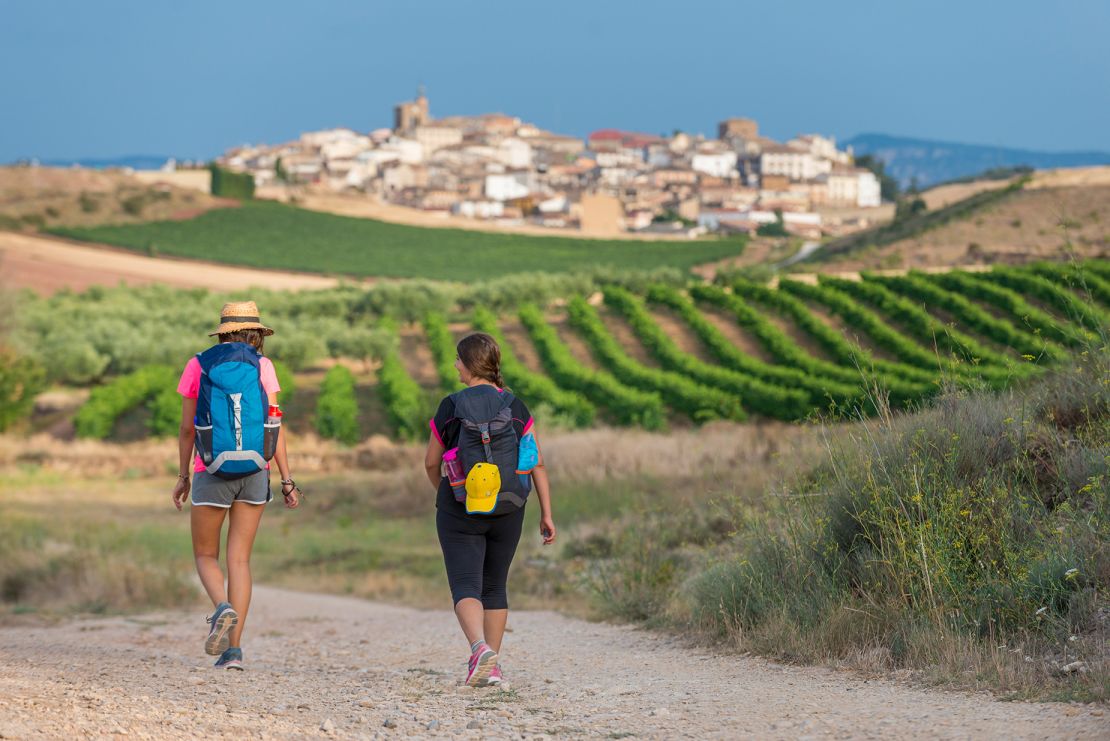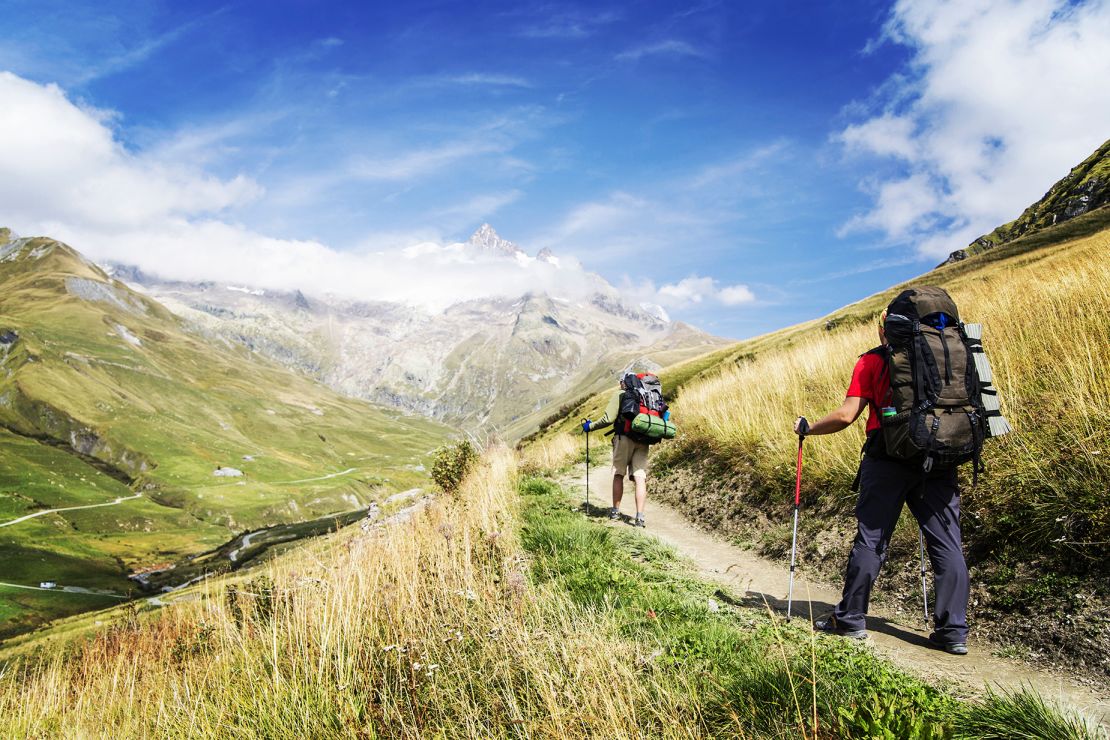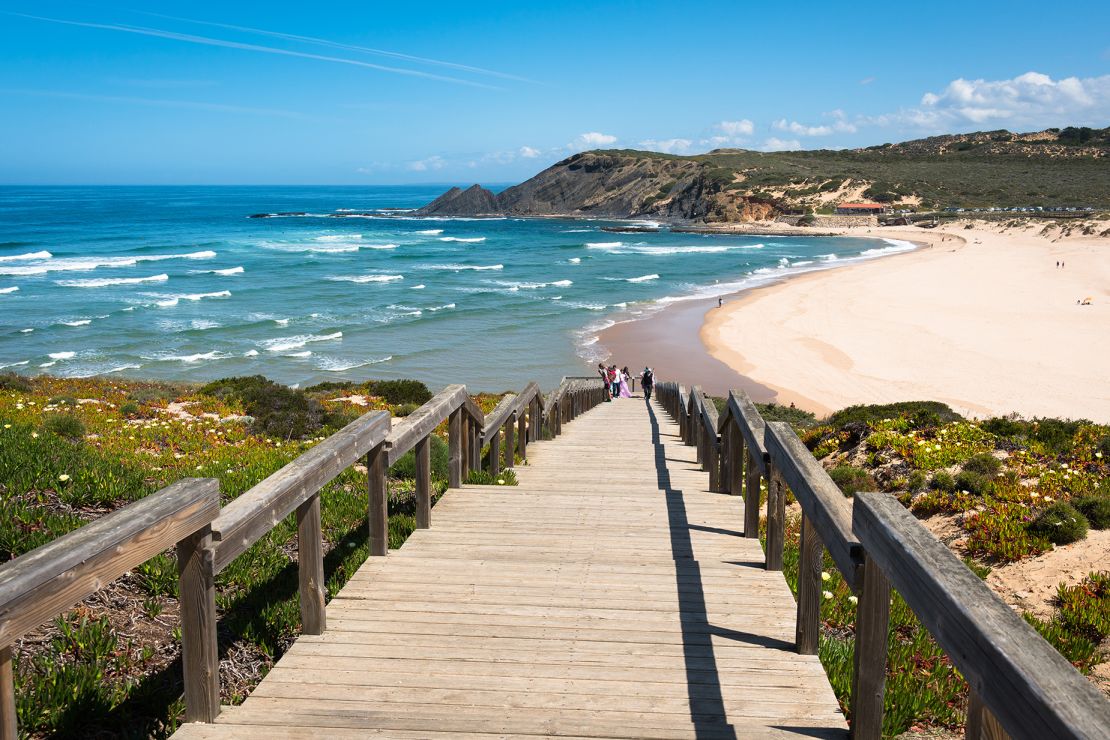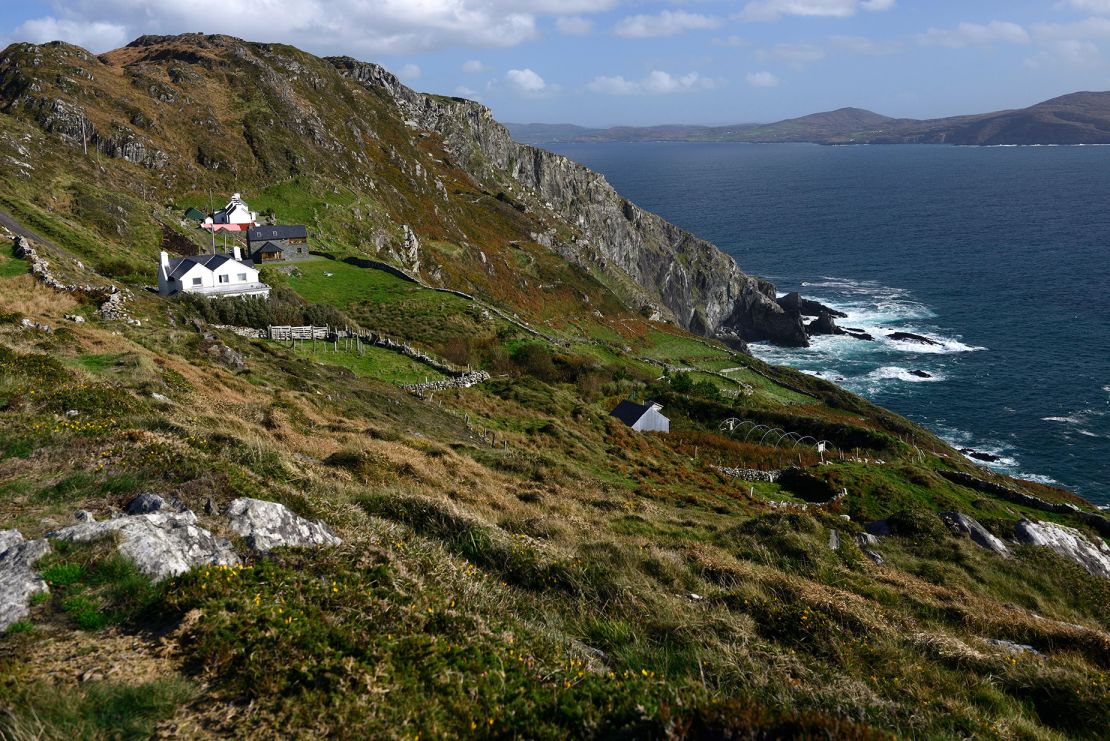CNN
—
The slow approach to travel has never been more important. From overtourism to taking multiple flights, rushing from A to B isn’t just stressful, it can be environmentally damaging. Which is why, sometimes travel needs to be stripped back to basics – a pair of boots, a backpack and a map.
These mind-loosening multi-day hikes on some of Europe’s best long distance trails offer a chance to reconnect with the world, get some invigorating exercise and enjoy peaceful moments in some of the continent’s most beautiful scenery.
West Sweden’s quiet beauty is the star of the show on this 40-kilometer (25-mile), two-day hike. A circular route, it starts at Hyssna’s 12th century church, which can be accessed by bus from Gothenburg in just 40 minutes.
The trail passes through towering beech forests and offers the opportunity for a refreshing dip in Lilla Hålsjön lake, where there’s a dedicated swimming spot. The route is well signposted, with plenty of picnic spots and a well appointed camp site. For those in need of something a tad more luxurious, there’s the Hyssna Forest Resort, where five star cabins feature their own outdoor showers, vast picture windows and king size beds.
Karhunkierros Trail, Finland
Finnish Lapland is renowned as a winter destination, with magical displays of aurora borealis and a fascinating ancient Sami culture. It’s also home to the 82-kilometer (51-mile) Karhunkierros Trail, the most well-known long-distance walk in Finland.
It’s a route best explored in summer, when the nights are bright and the forests verdant. The path begins in Hautajärvi village in Lapland’s Salla and ends at the Rukatunturi Fell in Kuusamo, taking four days, depending on the weather, which can change rapidly. Passing through Oulanka National Park, there’s a sense of being in a true wilderness, where trout leap from rivers and lynx and wolverines prowl through the pines.
King Charles III England Coastal Path, England
Covering a colossal 4,300 kilometers (2,672 miles), the England Coast Path, named after the country’s king since 2022, is a lifetime’s undertaking for those who wish to cover every step. The good news is that it can be easily broken down into sections, with northwest, northeast, east, southeast and southwest regions to explore.
Whether taking in the rugged, high cliffs and gorgeous bays of Cornwall or the vast skies and deep silence of Suffolk and Norfolk, just a few days on this epic route will leave anyone rejuvenated.
It’s no surprise that the Slovenia Mountain Trail has become so popular. This stunning route, covering some 616 kilometers (362 miles) runs from Maribor in the country’s northeast, all the way to Ankaran, on the Adriatic Coast. And while doing it all in one go over 28 days might seem extreme, it can be broken into smaller sections.
There are routes through the forests and primeval bogs of the Pohorje Hills or across the Julian Alps, much of which form part of the beautiful Triglav National Park. There are 49 different mountain huts to choose from and those opting to complete the entire trek will scale some 23 mountains in the process.
John Muir Way, Scotland
Known as the “Father of the National Parks” in the US, Muir’s passion for the outdoors led him to set up the Sierra Club, arguably America’s most important environmental organization, as well as ensuring that the Yosemite Valley gained protected status.
It isn’t just in the United States where Muir is memorialized. In his native Scotland, the John Muir Way stretches coast to coast, from Helensburgh on the Firth of Clyde to Dunbar, Muir’s birthplace on the Firth of Forth. The 215-kilometer (134-mile) route takes around 10 days to complete, passing through Loch Lomond and the Trossachs National Park and through some of Scotland’s most bucolic and underappreciated countryside.
Vikos Gorge and Mount Gamila, Zagoria, Greece
The remote and beautiful mountains of Zagoria are arguably Greece’s best-kept secret. Tucked away in the northwest of the country, they offer spectacular hiking without the crowds. The highlight is undoubtedly the Vikos Gorge, which according to the Guinness Book of Records is the deepest gorge relative to its width in the world.
In places, its cliffs tower 1,350 meters (4,429 feet). Wander its dry riverbed in summer and keep an eye out for rare wild chamois hopping across the cliff faces. Trekking Hellas offers a three-day trek including the gorge and the chance to head to a mountain refuge on nearby Mount Gamila.
The untamed Apuseni Mountains in western Romania, part of the wider Carpathian Range, offer an insight into a part of Europe where time still moves slowly and the way of life is steeped in tradition.
Hiking through the majestic hills and seemingly endless forests, you can see peregrine falcons circling on thermals high above, while the footprints of wolves and European brown bears point to the presence of some of the continent’s most elusive creatures. Much Better Adventures runs a four day snowshoeing trek through the region in winter, where guests stay with Romanian families and receive a proper local welcome.
The Camino Frances, France and Spain

The Camino de Santiago is Europe’s most famous pilgrimage route, finishing in Santiago de Compostela in the Galicia region of northwest Spain. It is here where the remains of the apostle St James are said to be buried. Traditionally, pilgrims headed here from their homes from all across Europe, but now hikers have multiple ways to walk “the Camino,” whether across Spain, from Portugal or France.
The Camino Frances is the most popular route, starting in St. Jean in France before heading through Pamplona and Leon before arriving in Santiago. The full route can take seven weeks, or the final 100 kilometers, from Sarria, can be tackled in about six or seven days.
Italy’s Dolomites are one of the most rugged and awe-inspiring ranges on the continent. Those up for the challenge can hike from Dobbiaco in the north to Belluno in the south, a 120-kilometer (75-mile) jaunt that takes nine days.
The route clambers over rocky outcrops as jagged snow covered peaks rear up all around. The region’s hospitable mountain huts offer overnight places to rest and recuperate ahead of another tough day in the hills.
It’s worth taking time to explore around Passo Falzarego, where battles were fought during World War I. Some sections have cables to help walkers cross tough terrain. Trekkers will need to be in good shape, but it’s an unforgettable experience.
Engadine Panorama Trail, Switzerland
Summers in Switzerland are the stuff of dreams for those who love to strap on their boots and set off on an adventure. With warm temperatures, wildflower meadows and looming Alps, it’s a place for a proper escape from the day-to-day.
While many routes head high into the mountains, the Engadine Panorama Trail is more sedate, ideal for beginners or those keen on something less strenuous. The 55-kilometer (34-miles) route in the southeast of the country starts in Zernez and takes in traditional villages and sparkling lakes, with spectacular Alpine views at every turn. Ibex can often be spotted climbing high above the paths, which are well signposted.
Tour du Mont Blanc, France, Italy and Switzerland

Few multi-day hikes in Europe fire the imagination like the Tour du Mont Blanc. This 11 day epic covers 170 kilometers (105 miles) over 11 days and takes in three countries – France, Italy and Switzerland – following a route around western Europe’s highest mountain.
The good news is that things are extremely well organized, with regular water fountains and refuges every few miles. However, don’t show up thinking you can just bunk down for the night after a long day’s walking: Huts and refuges require booking in advance during the busy summer months.
Hiking anticlockwise from the village of Les Houches offers relentless views of Mont Blanc. Tour du Mont Blanc Hike offers bespoke guidance on getting the most from the trip.

A network of single-day and multi-day paths in the Alentejo and Algarve regions in southern Portugal, the Rota Vicentina can be easily overlooked for the mountainous thrills of central Europe. But the Fisherman’s Trail, a 225-kilometer (140-mile) path which cleaves to the Atlantic coastline, offers a wild and memorable alternative.
Following routes used by fishermen to access the ocean, this trail makes its way along sandy paths and over high cliff tops, with walkers having to contend with the wind and changing weather. The reward comes in the form of azure waters and huge views, not to mention the sense of being reinvigorated by all that sea air.
Laugavegur Hiking Trail, Iceland
Inaccessible during winter, Iceland’s ethereal Laugavegur Hiking Trail opens between July and September, drawing in committed hikers from across the globe. The reason? Its landscape is unlike anything else on Earth. Shaped by glaciers and the country’s relentless volcanic activity, this is a place where it’s impossible not to feel utterly infinitesimal.
The 55-kilometer (34-mile) route is best done over four days, giving time to tackle the challenging terrain and take in the views. Highlights include bathing in the geothermal springs at Landmannalaugar, marveling at the colorful slopes of Brennisteinsalda and walking over the lush valley of Hvanngil.
Six dedicated huts and adjacent campsites are available, but booking ahead or signing up for a guided adventure as advised as the path can get busy. Much Better Adventures has a range of options.
Sheep’s Head Way, Cork, Ireland

Ireland doesn’t lack when it comes to lush, windswept vistas. And few can match the Sheep’s Head Way, a 93-kilometer (57-mile route) in Cork, which takes in some of the county’s, and the country’s, most dramatic coastline.
Starting in the town of Bantry, it heads out to the Sheep’s Head peninsula and its titular lighthouse, with views across the raging, bright blue Atlantic to the Beara and Mizen peninsulas. The route itself takes six days, but there are options to cut it short or opt for less taxing day hikes if the weather gets a little wild. Which, in this magical part of the world, it often does.











